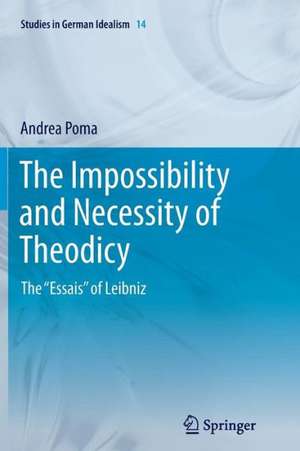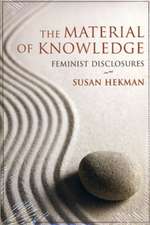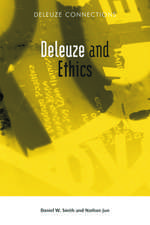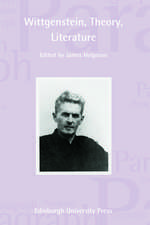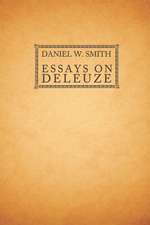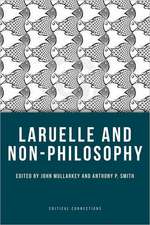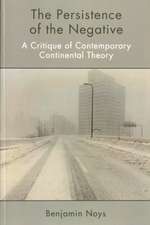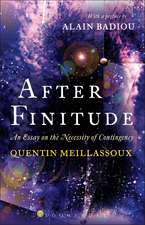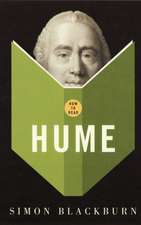The Impossibility and Necessity of Theodicy: The “Essais” of Leibniz: Studies in German Idealism, cartea 14
Autor Andrea Pomaen Limba Engleză Paperback – 15 oct 2014
| Toate formatele și edițiile | Preț | Express |
|---|---|---|
| Paperback (1) | 728.28 lei 6-8 săpt. | |
| SPRINGER NETHERLANDS – 15 oct 2014 | 728.28 lei 6-8 săpt. | |
| Hardback (1) | 732.70 lei 6-8 săpt. | |
| SPRINGER NETHERLANDS – 22 sep 2012 | 732.70 lei 6-8 săpt. |
Din seria Studies in German Idealism
-
 Preț: 407.19 lei
Preț: 407.19 lei - 18%
 Preț: 1835.53 lei
Preț: 1835.53 lei - 18%
 Preț: 789.20 lei
Preț: 789.20 lei - 15%
 Preț: 638.89 lei
Preț: 638.89 lei - 19%
 Preț: 542.50 lei
Preț: 542.50 lei - 18%
 Preț: 949.10 lei
Preț: 949.10 lei - 15%
 Preț: 646.62 lei
Preț: 646.62 lei - 15%
 Preț: 652.49 lei
Preț: 652.49 lei -
 Preț: 387.75 lei
Preț: 387.75 lei - 18%
 Preț: 792.19 lei
Preț: 792.19 lei - 24%
 Preț: 796.86 lei
Preț: 796.86 lei - 18%
 Preț: 786.84 lei
Preț: 786.84 lei - 15%
 Preț: 643.00 lei
Preț: 643.00 lei - 18%
 Preț: 791.40 lei
Preț: 791.40 lei - 15%
 Preț: 642.83 lei
Preț: 642.83 lei - 18%
 Preț: 951.29 lei
Preț: 951.29 lei - 18%
 Preț: 1231.47 lei
Preț: 1231.47 lei - 18%
 Preț: 955.25 lei
Preț: 955.25 lei - 15%
 Preț: 646.94 lei
Preț: 646.94 lei - 18%
 Preț: 957.62 lei
Preț: 957.62 lei - 18%
 Preț: 1116.57 lei
Preț: 1116.57 lei
Preț: 728.28 lei
Preț vechi: 888.14 lei
-18% Nou
Puncte Express: 1092
Preț estimativ în valută:
139.37€ • 151.34$ • 117.07£
139.37€ • 151.34$ • 117.07£
Carte tipărită la comandă
Livrare economică 23 aprilie-07 mai
Preluare comenzi: 021 569.72.76
Specificații
ISBN-13: 9789400798885
ISBN-10: 9400798881
Pagini: 328
Ilustrații: X, 318 p.
Dimensiuni: 155 x 235 x 17 mm
Greutate: 0.46 kg
Ediția:2013
Editura: SPRINGER NETHERLANDS
Colecția Springer
Seria Studies in German Idealism
Locul publicării:Dordrecht, Netherlands
ISBN-10: 9400798881
Pagini: 328
Ilustrații: X, 318 p.
Dimensiuni: 155 x 235 x 17 mm
Greutate: 0.46 kg
Ediția:2013
Editura: SPRINGER NETHERLANDS
Colecția Springer
Seria Studies in German Idealism
Locul publicării:Dordrecht, Netherlands
Public țintă
ResearchCuprins
List of abbreviations and symbols.- 1 Introduction. – 1.1 Theodicy.- 1.2 Philosophical Theodicy.- 1.3 The Theodicy of Leibniz.- 2True Piety.- 2.1 Truth and Appearance.- 2.2 The Fundamental Truths of Faith.- 2.3 Light and Virtue.- 2.4 The Love of God.- 2.5 Fatum Christianum.- 3 Faith and Reason.- 3.1 The General Terms of the Controversy.- 3.2 Reason.- 3.3 Truth over and against Reason: Mystery.- 3.4 Faith and Apologetics: Comprehending and Upholding.- 3.5 The Antagonist of the Theodicy: Sceptcism.- 4 Apologetic Arguments in the Theodicy.- 4.1 The Brief.- 4.2 The Legal Arguments.- 4.3 The Apologetic Arguments.- 4.4 The Antagonist of the Theodicy: Gnosis.- 5 Predetermination and Free Will.- 5.1 Absolute Necessity vs. Hypothetical and Moral Necessity.- 5.2 Contingency.- 5.3 The Will.- 5.4 Freedom.- 6 Evil and the Best of All Possible Worlds.- 6.1 The Principle of “the Best”.- 6.2 The Best of all Possible Worlds.- 6.3 Evil.- 6.4 Evil in the Best of all Possible Worlds.- 7 God and the Reason Principle.- 7.1 Divine Attributes: Faculties and Values.- 7.2 The Central Role of Wisdom.- 7.3 The Existence of God.- 7.4 The Necessary Being and the Supremely Perfect Being.-7.5 God and the Reason Principle.- 8 Conclusion.- 8.1 The Theodicy of Leibniz.- 8.2 Philosophical Theodicy.- 8.3 Theodicy.- Appendix One. The Metaphor of the “Two Labyrinths” and its Implications in Leibniz’s Thought.- Appendix Two. The reasons of Reason According to Leibniz.- Appendix Three. From Ontology to Ethics: Leibniz vs. Eckhard.- Appendix Four. Moral Necessity in Leibniz.- Index Nominum.
Textul de pe ultima copertă
This book provides an analytical interpretation of Leibniz's 'Essais de Théodicée' with wide-ranging references to all his works. It shows and upholds many thesis: Leibniz's rational conception of faith, his rational notion of mystery, the reformation of classical ontology, and the importance of Leibniz's thought in the tradition of the critical idealism.
In his endeavor to formulate a theodicy, Leibniz emerges as a classic exponent of a non-immanentist modern rationalism, capable of engaging in a close dialogue with religion and faith. This relation implies that God and reason are directly involved in posing the challenge and that the defence of one is the defence of the other. Theodicy and logodicy are two key aspects of a philosophy which is open to faith and of a faith which is able to intervene in culture and history.
In his endeavor to formulate a theodicy, Leibniz emerges as a classic exponent of a non-immanentist modern rationalism, capable of engaging in a close dialogue with religion and faith. This relation implies that God and reason are directly involved in posing the challenge and that the defence of one is the defence of the other. Theodicy and logodicy are two key aspects of a philosophy which is open to faith and of a faith which is able to intervene in culture and history.
Caracteristici
Provides new insights in Leibniz's Theodicy Shows that a close dialogue between modern rationalism and faith is crucial to Leibniz's thought Offers wide-ranging references to all his works, and as such helps to understand the thought of Leibniz in general
